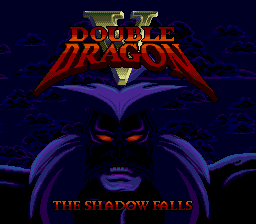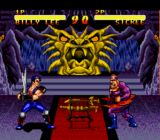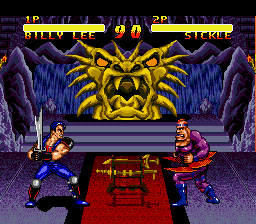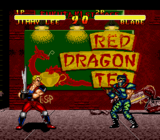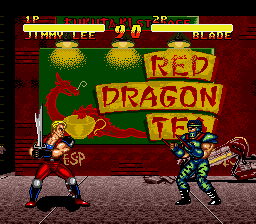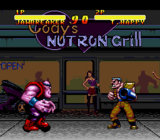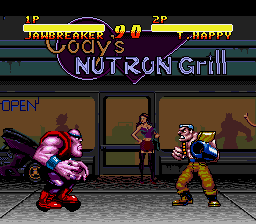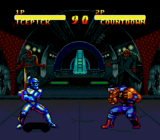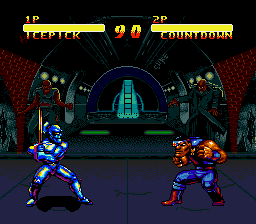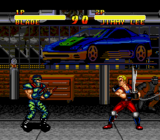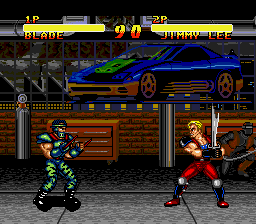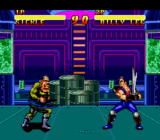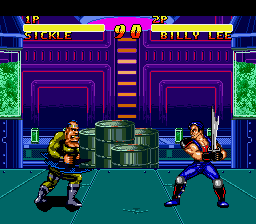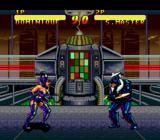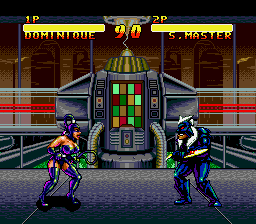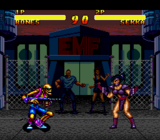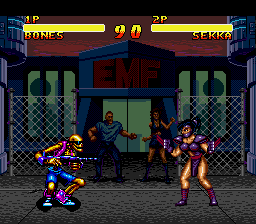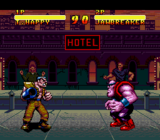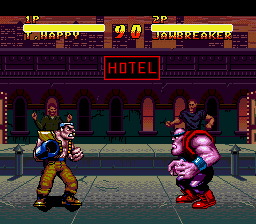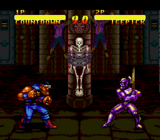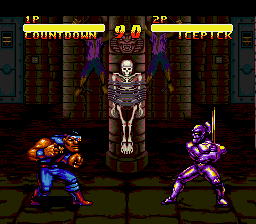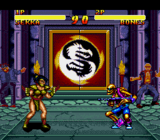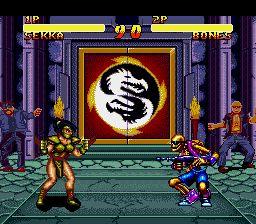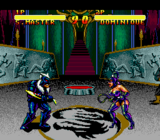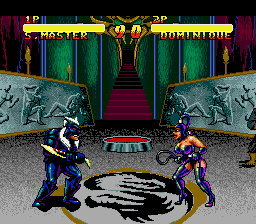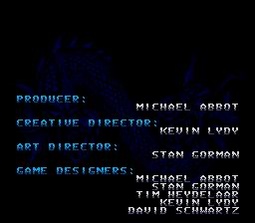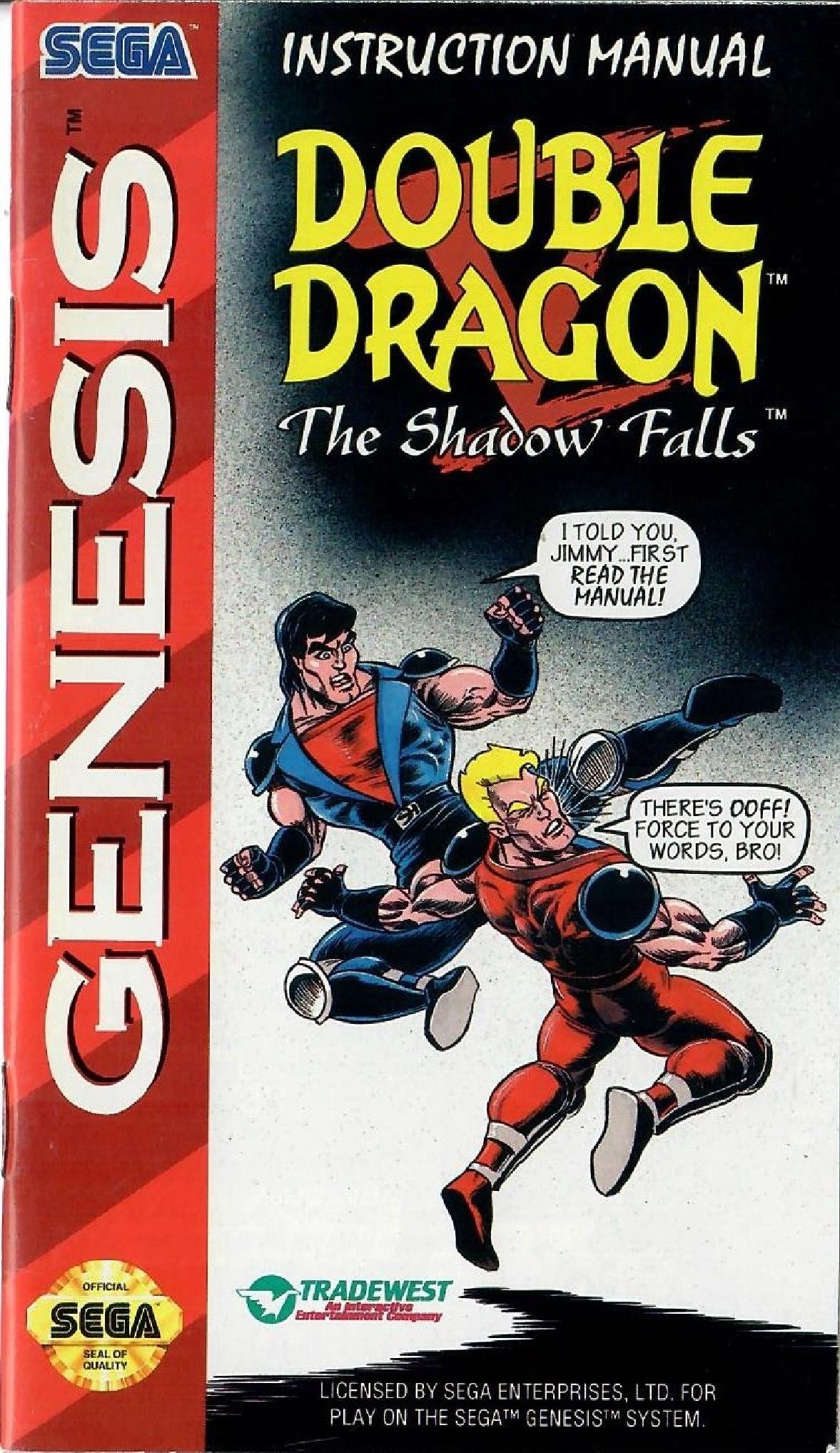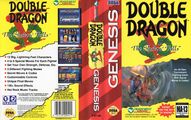Double Dragon V: The Shadow Falls
From Sega Retro
| Double Dragon V: The Shadow Falls | ||||||||||
|---|---|---|---|---|---|---|---|---|---|---|
| System(s): Sega Mega Drive | ||||||||||
| Publisher: Tradewest | ||||||||||
| Developer: Leland Interactive Media | ||||||||||
| Sound driver: GEMS | ||||||||||
| Peripherals supported: Six Button Control Pad | ||||||||||
| Genre: Action | ||||||||||
| Number of players: 1-2 | ||||||||||
| ||||||||||
|
Double Dragon V: The Shadow Falls is a 1994 competitive fighting game developed by Leland Interactive Media and published by Tradewest for the Sega Mega Drive. It was also released for the Super NES and Atari Jaguar. The change in genre from the side-scrolling beat-'em-up format of the previous games to one-on-one fighting was due to the popularity of games such as Street Fighter II and Mortal Kombat at the time.
Despite the title, Double Dragon V has no continuity with the previous games in the series, and it was actually a tie-in to the Double Dragon animated series airing at the time. The unusual numbering was due to the existence of Super Double Dragon, a Super NES-exclusive game in the series that was released in 1992. Former series' developer Technos Japan had very minimal involvement with Double Dragon V, and the game was never sold in Japan. An unrelated Double Dragon IV would later be released for the PlayStation 4 and PC in 2017.
Contents
Story
The Lee brothers, Billy and Jimmy, were separated at birth: Billy is raised by an elderly martial arts master known as the Oldest Dragon, and Jimmy is raised by the evil Shadow Master. When Jimmy is betrayed by the Shadow Master, he renounces his evil ways and joins his brother as a Dragon Warrior. The brothers fight a war against the Shadow Master and his henchmen for control of Metro City.
Gameplay
The game is a fighting game that plays similarly to Street Fighter II. Two fighters square off in a small arena and compete to drain the other's health bar by landing attacks (or by having more health left than the opponent when the timer runs out). The first fighter to win two rounds is the victor. Characters have several special moves, as well as finishing moves called "Overkills" where the losing character has a unique death animation when defeated by a certain type of basic attack in the final round of a match.
Characters move with ![]() and
and ![]() , crouch with
, crouch with ![]() , and jump with
, and jump with ![]() . Characters can punch with
. Characters can punch with ![]() (light),
(light), ![]() (medium), and
(medium), and ![]() (hard) and kick with
(hard) and kick with ![]() (light),
(light), ![]() (medium), and
(medium), and ![]() (hard). When playing with a standard three-button control pad, START toggles between punches and kicks. Using combinations of buttons can trigger special moves such as fireballs and thrust attacks. Opponents can be grabbed or thrown by pressing the D-Pad toward them while pressing a medium or hard punch or kick button. Attacks, other than grapple moves, can be blocked by holding the D-Pad away from the opponent. Characters can become temporarily stunned after receiving repeated attacks.
(hard). When playing with a standard three-button control pad, START toggles between punches and kicks. Using combinations of buttons can trigger special moves such as fireballs and thrust attacks. Opponents can be grabbed or thrown by pressing the D-Pad toward them while pressing a medium or hard punch or kick button. Attacks, other than grapple moves, can be blocked by holding the D-Pad away from the opponent. Characters can become temporarily stunned after receiving repeated attacks.
Players are given nine skill points that can be distributed between Strength, Defense, or Special, which can be set as high as five. Strength and Defense can be set to a minimum of one, while Special can be disabled entirely, allowing the player to invest more in attack power or vitality at the cost of not being able to use special moves. There are four difficulty levels for computer-controlled opponents (Easy, Normal, Hard, and Pro).
Modes
The game features multiple modes:
- Tournament: An arcade-style single-player mode where the player competes against a series of computer-controlled opponents, with each character having his or her own ending.
- Vs Battle: A two-player mode where one player battles another.
- Quest Mode: A single-player story mode where the character competes in a series of plot-based matches. The player can choose to play as one of the Lee brothers, who are on a mission to stop the Shadow Master from releasing a plague, or play as one of the Shadow Warriors, who must compete to become the Shadow Master's new second-in-command. Like the Vs Battle mode, the player can adjust the attributes of the selected character.
- Battle Demo: A demo mode where the player can pit two computer-controlled characters against each other.
- Dossiers: A gallery of character profiles.
Characters
Move lists assume the player is facing right. If facing left, ![]() and
and ![]() should be reversed. P refers to any of the punch buttons, while K refers to any of the kick buttons.
should be reversed. P refers to any of the punch buttons, while K refers to any of the kick buttons.
There are twelve available characters (including two boss characters). Bones, Sekka, Blade, and Dominique are original characters who never appeared on the television series.
Bosses
The two bosses are playable in every mode except the Quest Mode with a cheat code.
| Dominique | |||||||||||||||
|---|---|---|---|---|---|---|---|---|---|---|---|---|---|---|---|
|
Overkilled by: Standing MP | |||||||||||||||
A dangerous dominatrix with a whip and knives at the tips of her high heels. Dominique is the personal bodyguard of the Shadow Master and his most loyal and devoted minion. She is a sub-boss who precedes the Shadow Master.
| |||||||||||||||
| Shadow Master | |||||||||||||||
|
Overkilled by: Standing HK | |||||||||||||||
The master of all Shadow Warriors. He is evil and deceptive, and his ultimate goal is to cover the world in darkness and shadow. He has many powers which include shapeshifting and teleporting, and he is able to trap warriors who fail him in the Shadow Mural. He has a scythe, the lower half of which can detach and be used as the sword. He is the final boss of the game.
|
Stages
Production credits
- Producer: Michael Abbot
- Creative Director: Kevin Lydy
- Art Director: Stan Gorman
- Game Designers: Michael Abbot, Stan Gorman, Tim Heydelaar, Kevin Lydy, David Schwartz
- Lead Programmer: Robert Sun
- Programmer: David Schwartz, Mike Waltman
- Game Artist: Derek Benson, Frank Borowitz, Rex Cataroja, Sukru Gilman, Francisco Gracia, Mark May, Greg Miller, Harry Teasley
- Additional Artists: Juan Galceran, Gary Luecker, Michael Platteter
- Music: Rob Atesalp
- Sound Effects: Orpheus Hanley
- Story Consultants: Derek Benson, David Schwartz
- Quality Control: Randy Estrella, Tim Heydelaar, Brian Johnson, Steve Kramer, Dan Lewis, John Stookey
- Illustration & Print Director: Debbie Austin
- Packaging & Manual Concept and Production: Steve High, Shawn Murphy, Debbie Austin, Beeline Group, Inc.
Magazine articles
- Main article: Double Dragon V: The Shadow Falls/Magazine articles.
Promotional material
Physical scans
| Sega Retro Average | ||||||||||||||||||||||||||||||||||||||||||||
|---|---|---|---|---|---|---|---|---|---|---|---|---|---|---|---|---|---|---|---|---|---|---|---|---|---|---|---|---|---|---|---|---|---|---|---|---|---|---|---|---|---|---|---|---|
|
| 58 | |
|---|---|
| Based on 8 reviews | |
Technical information
- Main article: Double Dragon V: The Shadow Falls/Technical information.
References
- ↑ 1.0 1.1 EGM², "July 1994" (US; 1994-07-19), page 145
- ↑ File:Double Dragon V MD credits.pdf
- ↑ File:DoubleDragonV MD US Manual.pdf, page 5
- ↑ 1700 igr dlya Sega, "" (RU; 2001-xx-xx), page 61
- ↑ Game Players, "Vol. 7 No. 10 October 1994" (US; 1994-xx-xx), page 112
- ↑ GamePro, "October 1994" (US; 1994-xx-xx), page 56
- ↑ Sega Pro, "November 1994" (UK; 1994-10-06), page 70
- ↑ Sega Mega Drive Review, "1" (RU; 1995-04-03), page 44
- ↑ Tricks 16 bit, "Tricks Sega Gold 800 igr" (RU; 1998-03-20), page 53
- ↑ Video Games, "11/94" (DE; 1994-10-26), page 115
- ↑ VideoGames, "November 1994" (US; 1994-1x-xx), page 114
| Double Dragon V: The Shadow Falls | |
|---|---|
|
Main page | Comparisons | Hidden content | Magazine articles | Reception | Region coding | Technical information | Bootlegs | |
| Double Dragon games for Sega systems | |
|---|---|
| Double Dragon (1988) | |
| Double Dragon II: The Revenge (1991) | Double Dragon (1992) | Double Dragon 3: The Rosetta Stone (1992/1993) | Battletoads/Double Dragon: The Ultimate Team (1993) | Double Dragon V: The Shadow Falls (1994) | |
| Double Dragon (1993) | |
